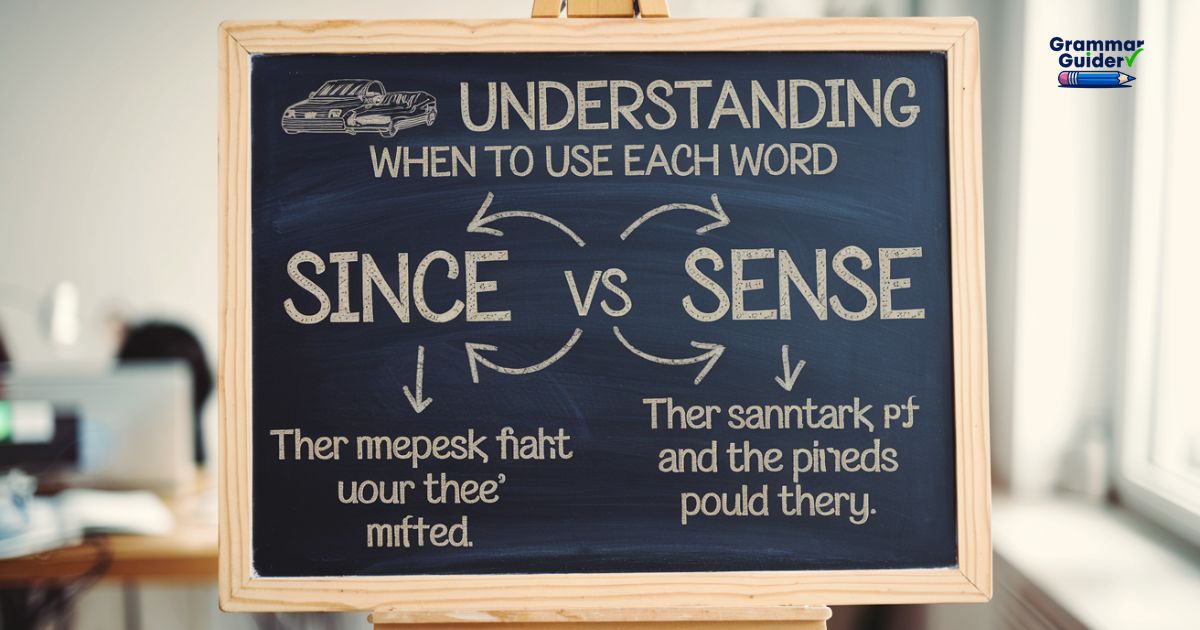Since vs Sense are two words that sound similar but have different meanings. Knowing when to use each word can help you write clearly. Since is used to show time or reason. Sense is used for perception or understanding.
Understanding the difference between Since and Sense will improve your writing. Since shows a starting point in time or gives a reason. Sense refers to how we feel, understand, or perceive something. This guide will help you use these words correctly.
Since
- Since is used as a conjunction to show time. It tells us when something started in the past. For example: “I have been here since 9 AM.”
- Since can also be used as a conjunction to show reason. It means “because.” For example: “Since you are here, let’s start.”
- As a preposition, since talks about a specific time in the past. For example: “I have known her since childhood.”
- Since is used as an adverb to show something started in the past and continues until now. For example: “He left home two years ago and hasn’t been seen since.”
Sense
- Sense as a noun refers to how the body feels things like sight, smell, hearing, taste and touch. Example: “Humans have five senses.”
- Sense also means understanding or judgment. It is the ability to understand something clearly. Example: “He has a good sense of direction.”
- Sense can refer to the meaning of something. It helps us understand what something means. Example: “This sentence makes no sense.”
- As a verb, sense means to feel or become aware of something. Example: “She could sense the tension in the room.”
“Since” vs “Sense”
- “Since” shows time or reason. It talks about something starting in the past or explains why something happens. Example: “I stayed home since it was raining.”
- “Sense” is about understanding, feeling, or meaning. It helps us talk about what we feel or know. Example: “This story makes no sense.”
“Since” as a Time Traveler (or Reason Giver):
“Since” helps mark the beginning of a time or show a reason. For example, you can say, “I have worked here since 2010″ to show when something started. It also explains why something happens, like “I stayed home since I was sick.”
When you use since for time, it tells when something began. You can also use since to give a reason, like “Since it’s raining, I’ll stay inside.” In both cases, since helps explain the starting point or cause of something.
“Sense” as Your Internal Compass:
“Sense” helps us understand the world around us. It relates to perception and how we feel things. For example we use our senses like sight and touch to explore everything.
“Sense” also means understanding something clearly. It guides us like an internal compass to make good decisions.
| Feature | Since | Sense |
|---|---|---|
| Part of Speech | Preposition, Conjunction | Noun, Verb |
| Meaning | Time or Reason | Perception, Feeling, Meaning |
| Function | Shows time or reason | Describes feeling or understanding |
| Example | “I’ve lived here since 2010.” | “This doesn’t make any sense.” |
Putting it into Practice: Makes Sense or Since?
When deciding whether to use “since” or “sense”, remember that “since” introduces a reason or a starting point in time. For example “Since it’s raining, I need an umbrella.” It helps explain why something happens.
On the other hand, “sense” refers to understanding or perception. For example, “It makes sense to wear a jacket when it’s cold.” It shows something is logical or clear. Always choose the word that fits the meaning you want to express.
Examples in Context
Examples in Context show how to use “since” and “sense” in real sentences. For “since”, we use it to show time or reason. For “sense”, we use it to describe feeling, understanding, or meaning.
Since (Time and Reason):
- Since shows a starting point in the past, like “I have lived here since 2010.”
- Use since to explain a reason. For example, “We stayed home since it was raining.”
- Since connects past actions to the present. Example: “He hasn’t called since last week.”
- Since is also used for time. Example: “She has been studying since morning.”
Sense (Understandings and Feelings):
- Sense is the ability to understand things like when you know what something means.
- Sense also refers to feelings like when you feel something in your body, such as hunger or excitement.
- Sense helps you know how things are like how you can tell if something is hot or cold.
- When you sense something it means you feel or understand it without needing to think too much.
Words You Can Use in Place of “Since” and “Sense”
You can use “from” when talking about a starting time. Use “because” to show a reason. For “sense,” try words like “meaning” or “perception.” These words help you explain ideas clearly, making your writing stronger.
Since
When indicating time:
- From: Use when saying when something started.
- Example: “I have worked here from 2015.”
- After: Use when talking about something that happens next.
- Example: “I felt better after I took the medicine.”
- Following: Use to show what happens next.
- Example: “Following the meeting, we had lunch.”
When indicating reason:
- Because: Use when explaining why something happened.
- Example: “I stayed home because I was sick.”
- As: Use when giving a known reason.
- Example: “As it rained, the game was canceled.”
- Due to: Use in formal writing to show a reason.
- Example: “The match was canceled due to rain.”
- Inasmuch as: Use in formal writing for “because.”
- Example: “He was praised inasmuch as he helped everyone.”
Sense
Words for “Sense” (Perception or Feeling)
- Sensation: Physical feeling.
- Example: “She felt a tingling sensation in her fingers.”
- Perception: How something is understood.
- Example: “His perception of the event was different.”
- Awareness: Knowledge of something.
- Example: “There was more awareness of the issue.”
- Intuition: Understanding without thinking hard.
- Example: “Her intuition told her something was wrong.”
Words for “Sense” (Meaning or Understanding)
- Meaning: Definition.
- Example: “The meaning of the poem was unclear.”
- Significance: Importance.
- Example: “The significance of the discovery is great.”
- Understanding: Grasping the concept.
- Example: “He has a deep understanding of the topic.”
- Interpretation: Explanation of something.
- Example: “Her interpretation was different.”
Origins of “Since” and “Sense”
The word “since” comes from Old English “siþþan,” which means “after” or “later.” It changed over time into different forms before becoming the word we use today. It marks a starting point in time or introduces a reason.
The word “sense” comes from the Latin word “sensus,” meaning “feeling” or “perception.” It entered English around the 14th century. Sense is used to talk about perception, like the five senses, or to describe understanding and meaning.
FAQ’s
What is the difference between “Since” and “Sense”?
Since is used for time or reason, while “sense” refers to understanding or feeling.
How do we use “Since” to talk about time?
We use “since” to show when something started. For example, “I have worked here since 2010.”
How do we use “Sense” for understanding?
“Sense” means to understand something. For example, “This story makes no sense.”
Can “Since” be used to show a reason?
Yes,”since” can mean because. For example, “I stayed home since I was sick.”
When should I use “Sense” to talk about feelings?
We use “sense” to talk about feelings or intuition. For example, “I get a bad sense about this situation.”
Can I replace “Since” with “Because”?
Yes, you can replace “since” with “because” when showing reason. For example, “Since it’s raining” becomes “Because it’s raining.”
Conclusion
Understanding the difference between “since” and “sense” makes writing easier and clearer. “Since” helps show time or a reason, like when something started or why something happened. “Sense” talks about feelings, perception, or the meaning of something. Both words are important but have very different uses.
Always use “since” when talking about a starting point in time or to explain a reason. Use “sense” when explaining understanding, feeling, or how something is logical. Simple examples can help you choose the right word in sentences.
By remembering their meanings, you can write better and avoid mistakes. Using “since” and “sense” correctly shows clear thinking. These words make your writing easy to read and professional.

Jacob Harrison is the seasoned writer behind Grammar Insights, with over nine years of experience in the field. Passionate about language, he shares practical tips and strategies to help readers enhance their grammar and writing skills. With a friendly approach, Jacob makes learning accessible and enjoyable for everyone.

